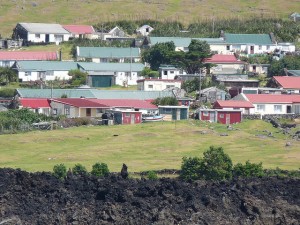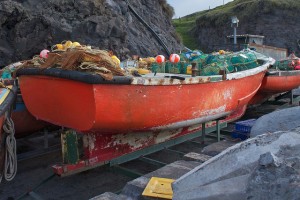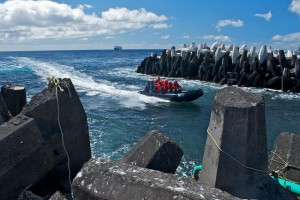The Tristan Islanders celebrated the last day of the old year with traditional merry making—parties, two elaborate receptions, and a speech by the Administrator. The Tristan da Cunha website has posted pictures and information about their celebration of New Year’s, an important annual festival on the island.

The weather was fine on Tristan that day—it’s the middle of summer in the Southern Hemisphere. Alex Mitham, the Administrator, began the festivities with a reception at his residence in the Settlement for the Islanders starting at 6:00 in the evening. Later, people migrated to the home of the Chief Islander, who was also hosting a reception. Many then returned to their own homes, but at midnight the community gathered at the gong to ring in the New Year. Many parties continued for hours after that.
During the reception at the Residence, Mr. Mitham delivered his official Old Year’s Night message before a large crowd of people outside on the lawn. It was a state of the island speech that included plans for the coming New Year. He opened his remarks by graciously noting that an 11-year old Tristan boy, Nathan Swain, was the Junior Winner in the Queen’s Commonwealth Essay Competition for 2015, run by the Royal Commonwealth Society in the U.K.
The competition had received over 13,000 entries from throughout the Commonwealth countries and territories. Nathan’s picture and a link to his essay “I Am the Future” are provided on the website of the competition. With Nathan as an excellent example, Mr. Mitham argued, the future of the island will be in good hands.

But the Administrator mixed careful doses of reality with his optimism. He expressed concern about the quality of the fishing resources around Tristan and its neighboring islands. He said that they would have “hard questions to face” in the coming year, though he didn’t elaborate beyond that.
He said that the financial situation of the Island is “stable,” though caution is needed in 2016 about their finances. The economy is fragile, and he expressed concern that the Islanders need to look at alternative sources of income. Island leaders are exploring what he called a “White Fish licensing” initiative, and some benefits are already coming in from that source.
He said that he had been pessimistic about the future during recent months because of various worldwide financial issues, but the fact that the island has secured approval to proceed with some important infrastructure projects gives him hope. The coming year should mark the updating of a range of services for the future. He did note that the visit in 2016 of the Royal Mail Ship will be the end of its service. He felt that everyone on the island will be sad to see the RMS depart for the last time.

He said that a project to rebuild and deepen the island’s small, artificial harbor has been approved. Also, a new healthcare center has been approved, plus new accommodations for doctors, new teachers, improvements to the roads, and a cleanup of the island as a whole are all in the planning stages. He is eager for further ideas from the Royal Institute for British Architects (RIBA) competition, announced in April 2015.
Mr. Mitham said that in 2016 the island will celebrate the bicentennial of the British annexation of Tristan da Cunha and the establishment of the first permanent British settlement on the island. He paid tribute to the hard work of the Island Council, the Chief Islander, and the Acting Chief Islander. He thanked the heads of the different departments and their staffs, as well as the people who had contributed to the reception that evening.
To judge by the pictures on the website, although the parties and the speech may have been important, the highlights for the residents in the Settlement were undoubtedly the activities of the Okalolies, elaborately masked people—mummers—who circulated through the village doing mischief. One picture shows a bunch of Okalolies wearing elaborate new masks and preparing to march on the residence of the Administrator.
The term “Okalolies” is of uncertain origin, but the custom of adopting masks and mumming goes a long ways back on the island, as it does in some other European cultures. Katherine Mary Barrow recorded on New Year’s 1907 that “several [of the men] are fantastically dressed and equipped with every available instrument” as they went from house to house enjoying parties (Barrow 1910, p.108).
In his landmark book The Sociology of Tristan da Cunha, Munch (1945), p.289-290, related how the amiable men in the Norwegian Scientific Expedition reacted positively on December 31, 1937, to the invitation by the Tristan Islanders to join them in their New Year’s Eve festivities.
Munch wrote that the Tristan men dressed up in women’s clothing, decorated hats with garden flowers, and put on old rags as disguises, and Munch and his colleagues followed suit. Some of them blackened their faces, put on the tails of cows, and in general tried to hide their identities. They all then went about from house to house. At each, they received refreshments from the women, such as hot drinks and bread. They would then participate in dances. The male hosts would sing songs to their guests before they departed, making as much noise as possible.
The entry in Munch’s diary for January 1, 1938 (Munch 2008), provided a more detailed description of the festivities that evening. He added that the spirit of the celebration “seemed rather flat and formal,” which he attributed to the overbearing nature of the English missionary stationed on the island at the time of their visit. Harold Wilde had tried to discourage the activities of the mummers, “just as he always tries to do what he can to dampen the islanders’ natural humour and optimism (p.62),” Munch noted.
Munch wrote in his diary that he had learned of the man’s hostility to the Tristan customs, but he had intervened and told Wilde that he’d really like to see them. The guy had relented, apparently at the last minute, so the Islanders had done their mumming, but with dampened spirits. It is clear from the photos on the website that now, 78 years later, they have elaborate masks but they persist in their mumming tradition of ringing out the old year and welcoming in the new.